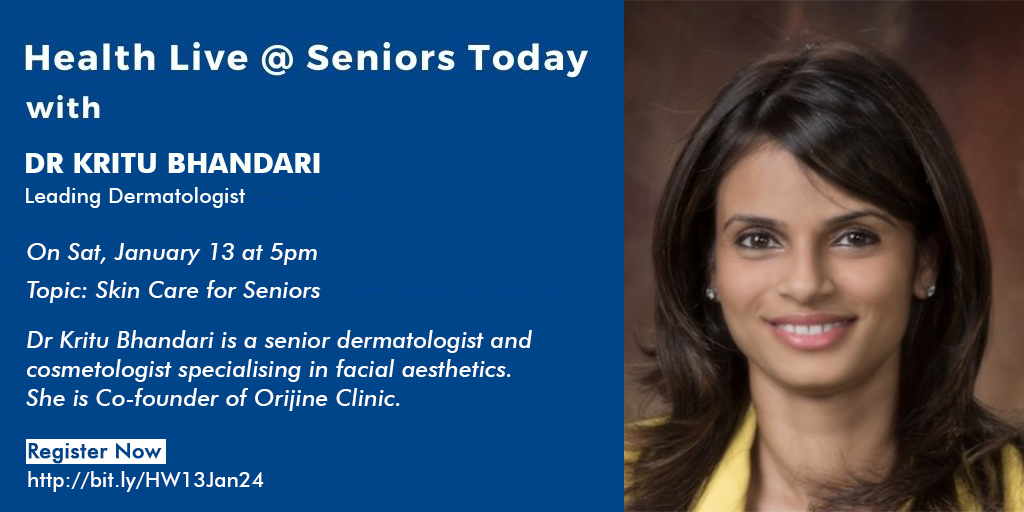On 13 Jan, 2024, Health Live@Seniors Today hosted their weekly webinar with Dr Kritu Bhandari, a leading dermatologist and cosmetologist, who spoke on and answered questions about Skin Care for Seniors.
Dr Kritu Bhandari, an MD in Dermatology and Cosmetology, boasts extensive training from Sri Ramachandra Medical College and Research Institute in Chennai. As the founder and former director of Skinscape Clinic, she brings years of experience, having worked with esteemed medical groups such as Columbia Asia Hospital, Kaya Skin Clinic and Apollo Clinics.
Dr Bhandari is certified in Lasers and Aesthetic Procedures from the National Center, Singapore, and has received training under renowned dermatologists globally.
Specialising in facial aesthetics, she excels in minimally invasive procedures like botox, fillers, and thread lifts. Her expertise extends to skin rejuvenation, anti- ageing techniques, including lasers, chemical peels, and non- ablative methods.
Dr Bhandari, co- founder of Orijine Clinic five years ago, continues to make significant contributions to the field of dermatology and cosmetology.
A healthy and radiant skin reflects a lot of what is happening inside us. Having a good/ great skin is not just about looking good or feeling good in our youthful days, it is also about having good skin till we exist.
Skin is not just an organ of vanity, it is a very important and crucial organ. It is also a very dynamic organ which means that it is always changing.
Your skin is a mirror of what is happening in your external environment- such as the exposure to sun, dust, pollution, etc.- and also your internal self.
Your skin also boosts your confidence and helps and affects you psychologically. This statement stands true especially for the younger generation.
Our skin is made of many layers which are:
- Epidermis: this is the superficial layer. This is the layer where all your dead cells build up.
- Dermis: this comprises of collagen, amino acids, proteins, elastic fibres, hyaluronic acid, pigment producing cells, etc. this is an important layer for the texture of the skin.
- Superficial fat
- Muscle layer
- Ligament layer: the above two are responsible for your expressions
- Deep fat pad
- Bones
The changes that take place in our skin as we age include changes in all of the above mentioned layers. These changes happen as we change due to the following reasons:
- Gravity
- External and internal abuses
This also means that you have to take care of each of these layers as we age, to maintain your skin.
Our skin undergoes the following changes as we age:
- Collagen is an important protein, the building block of our skin. As we age, the collagen also breaks down. When your collagen starts depleting, that is when the support to your skin is getting lost. The softness, suppleness and firmness that is provided by collagen to your skin, gets depleted.
As we age, there are also certain hormonal changes that take place. Especially in women, the hormones are protective of the skin and hair and, following menopause there is a fall in these hormones. Because of these hormonal changes, the collagen starts depleting as a result of which the softness and suppleness slowly starts wearing off.
- There is a definite loss of elasticity. This is because of the loss of support and strength of certain elastic fibres which are present in the deep dermis, making the skin look saggy and dehydrated.
- When we are young, our skin has a lipid layer- a natural moisturising layer- which provides hydration to the skin. As we age, the hydration level starts going down due to the fall in the hyaluronic acid levels in the skin. Which is why as we age, our skin feels more dry, dull and dehydrated.
- The epidermis is the first protective layer of the skin and it starts thinning down as we age. Because of this, the capacity of our skin to heal also goes down.
- Almost 90% of the individuals over the age of 50 face the issue of fine lines and wrinkles, this is because the layers of your skin are connected and because of constant muscle use, depletion and volume loss at the level of lipid and fat layer, the skin starts to sag, resulting in fine lines and wrinkles.
- Pigmentation is also a common concern in individuals over the age of 50 years, this is because the dermis- which contains pigment containing cells- is responsible for the eve pigmentation of the skin. As we age, these cells may get blocked leading to uneven skin pigment, freckles, etc.
- Reduced sebum production classical resulting in a dry and dehydrated skin.
- Reduced elastin production leading to loss of elasticity of the skin and its suppleness.
- Reduced cell turn over rate.
A simple skincare routine at home is like food and fodder for a healthy looking skin. Skincare is not about applying multiple products or layering it up. It is about consistently doing a simple 3-4 step procedure at home.
Skin care helps us by:
- Providing us with the lost hydration and moisture balance
- Using a sunscreen will protect you from the environment. We are subjected to UV light- directly, indirectly, internally and externally. Even when you are not outside, we are still exposed to the lights from the bulbs and tube lights at home. The blue flame from the gas in the kitchen is also harmful for your skin.
- Having a skincare routine that has retinol further prevents your skin from further damage and wrinkles. The damage which is already done, cannot be completely reversed but it can prevent and delay the process.
Your daily skin care routine can include the following steps in its AM routine:
- Cleansing
- Serum- depending on your skin concern
- Moisturising
- Sunscreen
Your daily skin care routine can include the following steps in its PM routine:
- Cleansing
- Serum- for correction of specific concern
- Moisturising
- Eye care
Targeted treatments would include addressing concerns such as your pigmentation through treatment series such as chemical peels, lasers, etc.
Collagen boosting treatments are important since you loose 40% of your collagen after the age of 50, which further falls at a rate of 10% each year. These treatments include micro needling, radio frequency, PRP, hyaluronic acid injections.
Your eye area can be taken care of with the help of botox, fillers, micro needling, PRP, chemical peels.
To address your hair concerns, there are hair treatments as well.
Lifestyle modifications are extremely important. We are what we eat, so you need to maintain a balanced and regular diet.
- Incorporate foods that include anti oxidants such as berries, chia seeds, flax seeds, avocados.
- Green leafy vegetables
- Control unhealthy habits- smoking, including hookah, vaping, etc is very harmful for your skin. Drinking is moderation is acceptable
- Sleep- have a regular sleep cycle.
- Water intake- keep yourself well hydrated. Consume 350 ml/ kg of body weight per day.
- Stress management releases happy hormones thereby helping you maintain a health skin




